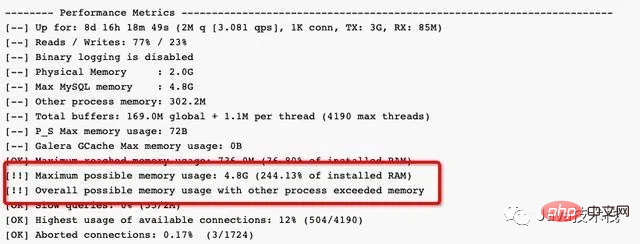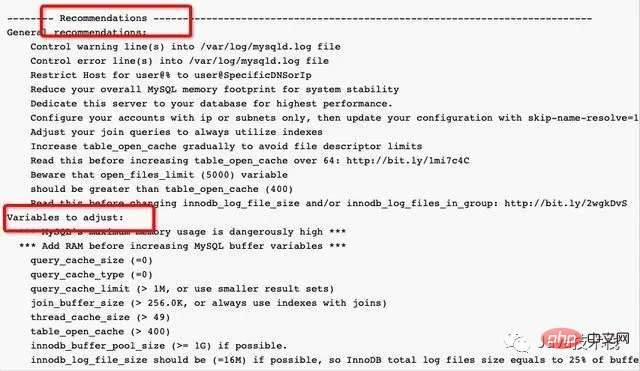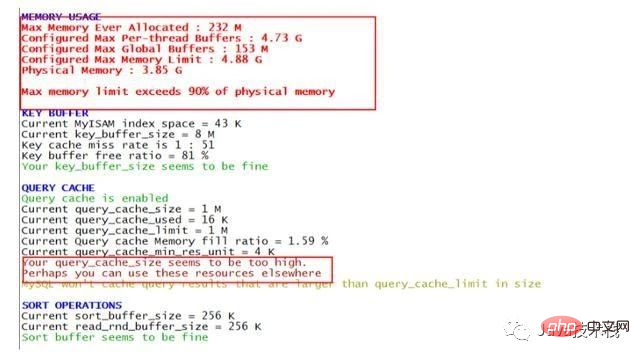4 useful MySQL tuning tools recommended
This article recommends 4 mysql optimization tools. You can use them to conduct a physical examination of your mysql and generate an awr report, allowing you to grasp the overall performance of your database.

Video recommendation: MySQL video tutorial
What is the performance of running mysql? Are the parameters set appropriately? Is it clear whether there are security risks in the account settings?
As the saying goes, if you want to do your job well, you must first sharpen your tools. Regular physical examination of your MYSQL database is an important means to ensure the safe operation of the database.
Today I would like to share with you several mysql optimization tools. You can use them to conduct a physical examination of your mysql and generate an awr report, allowing you to grasp the overall performance of your database.

1. mysqltuner-pl
This is a commonly used database performance diagnostic tool for mysql. It mainly checks the rationality of parameter settings. Includes log files, storage engines, security recommendations and performance analysis. It is a good helper for mysql optimization to provide suggestions for improvement based on potential problems.
In the previous version, MySQLTuner supported about 300 metrics for MySQL/MariaDB/Percona Server.
Project address: https://github.com/major/MySQ...
1.1 Download
[root@localhost ~]#wget https://raw.githubusercontent.com/major/MySQLTuner-perl/master/mysqltuner.pl
1.2 Use
[root@localhost ~]# ./mysqltuner.pl --socket /var/lib/mysql/mysql.sock >> MySQLTuner 1.7.4 - Major Hayden <major> >> Bug reports, feature requests, and downloads at http://mysqltuner.com/ >> Run with '--help' for additional options and output filtering\[--\] Skipped version check for MySQLTuner scriptPlease enter your MySQL administrative login: rootPlease enter your MySQL administrative password: \[OK\] Currently running supported MySQL version 5.7.23\[OK\] Operating on 64-bit architecture</major>
1.3. Report analysis
1) Important attention [!!] (items with exclamation marks in square brackets) such as [!!] Maximum possible memory usage : 4.8G (244.13% of installed RAM), indicating that the memory has been seriously exceeded.

#2) Pay attention to the last suggestions “Recommendations”.

2. tuning-primer.sh
This is another optimization tool for mysql, which is used to perform an optimization on mysql as a whole. Physical examination and optimization suggestions for potential problems.
Project address: https://github.com/BMDan/tuni...
Currently, the content that supports detection and optimization suggestions is as follows:

2.1 Download
[root@localhost ~]#wget https://launchpad.net/mysql-tuning-primer/trunk/1.6-r1/+download/tuning-primer.sh
2.2 Use
[root@localhost ~]# [root@localhost dba]# ./tuning-primer.sh -- MYSQL PERFORMANCE TUNING PRIMER -- - By: Matthew Montgomery -
2.3 Report analysis
Focus on the options with red alerts and modify them according to the suggestions and the actual situation of your own system, for example:

3, pt-variable-advisor
pt-variable-advisor can analyze MySQL variables and make recommendations on possible problems.
3.1 Installation
https://www.percona.com/downl...
[root@localhost ~]#wget https://www.percona.com/downloads/percona-toolkit/3.0.13/binary/redhat/7/x86\_64/percona-toolkit-3.0.13-re85ce15-el7-x86\_64-bundle.tar\[root@localhost ~\]#yum install percona-toolkit-3.0.13-1.el7.x86_64.rpm
3.2 Use
pt-variable-advisor is a sub-tool of the pt tool set, mainly used to diagnose whether your parameter settings are reasonable.
[root@localhost ~]# pt-variable-advisor localhost --socket /var/lib/mysql/mysql.sock
3.3 Report analysis
Focus on entries with WARN information, for example:
4. pt-qurey-digest
pt-query-digest’s main function is to analyze MySQL queries from logs, process lists and tcpdump.
4.1Installation
For details, please refer to Section 3.1
4.2Using
pt-query-digest Main Used to analyze mysql's slow logs. Compared with the mysqldumpshow tool, the analysis results of the py-query_digest tool are more specific and complete.
[root@localhost ~]# pt-query-digest /var/lib/mysql/slowtest-slow.log
4.3 Common usage analysis
1) Directly analyze slow query files:
pt-query-digest /var/lib/mysql/slowtest-slow.log > slow_report.log
2) Analyze queries within the last 12 hours:
pt-query-digest --since=12h /var/lib/mysql/slowtest-slow.log > slow_report2.log
3) Analyze queries within the specified time range:
pt-query-digest /var/lib/mysql/slowtest-slow.log --since '2017-01-07 09:30:00' --until '2017-01-07 10:00:00'> > slow_report3.log
4) Analyze slow queries that contain select statements
pt-query-digest --filter '$event->{fingerprint} =~ m/^select/i' /var/lib/mysql/slowtest-slow.log> slow_report4.log5) Slow queries for a certain user
pt-query-digest --filter '($event->{user} || "") =~ m/^root/i' /var/lib/mysql/slowtest-slow.log> slow_report5.log6) Query all slow queries of full table scan or full join
pt-query-digest --filter '(($event->{Full\_scan} || "") eq "yes") ||(($event->{Full\_join} || "") eq "yes")' /var/lib/mysql/slowtest-slow.log> slow_report6.log4.4 Report analysis
Part 1: Overall statistical results
Overall: How many queries are there in total? Time range: The time range of query execution unique: The number of unique queries, that is, after parameterizing the query conditions, how many different queries are there in total? Total: Total min: Minimum max: Maximum avg: average 95%: arrange all values from small to large, the number located in the 95th percentile, this number generally has the most reference value median: median, arrange all values from small to large, the number located in the middle
Part 2: Query group statistical results
Rank: Ranking of all statements, sorted by query time in descending order by default, specify Query ID through --order-by: ID of the statement, (remove excess spaces and text characters, calculate hash value) Response: total response time time : The total time proportion of this query in this analysis calls: The number of executions, that is, the total number of query statements of this type in this analysis R/Call: The average response time of each execution V/M: Response time Variance -to-mean ratio Item: Query object
Part 3: Detailed statistical results of each query
ID: Query ID number, corresponding to the Query ID in the above figure Databases: Database name Users: the number of executions by each user (proportion) Query_time distribution: query time distribution, the length reflects the interval proportion. Tables: Tables involved in the query Explain: SQL statement.
Life is wonderful, see you tomorrow~
For more programming-related knowledge, please visit: Introduction to Programming! !
The above is the detailed content of 4 useful MySQL tuning tools recommended. For more information, please follow other related articles on the PHP Chinese website!

Hot AI Tools

Undresser.AI Undress
AI-powered app for creating realistic nude photos

AI Clothes Remover
Online AI tool for removing clothes from photos.

Undress AI Tool
Undress images for free

Clothoff.io
AI clothes remover

Video Face Swap
Swap faces in any video effortlessly with our completely free AI face swap tool!

Hot Article

Hot Tools

Notepad++7.3.1
Easy-to-use and free code editor

SublimeText3 Chinese version
Chinese version, very easy to use

Zend Studio 13.0.1
Powerful PHP integrated development environment

Dreamweaver CS6
Visual web development tools

SublimeText3 Mac version
God-level code editing software (SublimeText3)

Hot Topics
 1664
1664
 14
14
 1423
1423
 52
52
 1317
1317
 25
25
 1268
1268
 29
29
 1243
1243
 24
24
 MySQL's Role: Databases in Web Applications
Apr 17, 2025 am 12:23 AM
MySQL's Role: Databases in Web Applications
Apr 17, 2025 am 12:23 AM
The main role of MySQL in web applications is to store and manage data. 1.MySQL efficiently processes user information, product catalogs, transaction records and other data. 2. Through SQL query, developers can extract information from the database to generate dynamic content. 3.MySQL works based on the client-server model to ensure acceptable query speed.
 Laravel Introduction Example
Apr 18, 2025 pm 12:45 PM
Laravel Introduction Example
Apr 18, 2025 pm 12:45 PM
Laravel is a PHP framework for easy building of web applications. It provides a range of powerful features including: Installation: Install the Laravel CLI globally with Composer and create applications in the project directory. Routing: Define the relationship between the URL and the handler in routes/web.php. View: Create a view in resources/views to render the application's interface. Database Integration: Provides out-of-the-box integration with databases such as MySQL and uses migration to create and modify tables. Model and Controller: The model represents the database entity and the controller processes HTTP requests.
 MySQL and phpMyAdmin: Core Features and Functions
Apr 22, 2025 am 12:12 AM
MySQL and phpMyAdmin: Core Features and Functions
Apr 22, 2025 am 12:12 AM
MySQL and phpMyAdmin are powerful database management tools. 1) MySQL is used to create databases and tables, and to execute DML and SQL queries. 2) phpMyAdmin provides an intuitive interface for database management, table structure management, data operations and user permission management.
 MySQL vs. Other Programming Languages: A Comparison
Apr 19, 2025 am 12:22 AM
MySQL vs. Other Programming Languages: A Comparison
Apr 19, 2025 am 12:22 AM
Compared with other programming languages, MySQL is mainly used to store and manage data, while other languages such as Python, Java, and C are used for logical processing and application development. MySQL is known for its high performance, scalability and cross-platform support, suitable for data management needs, while other languages have advantages in their respective fields such as data analytics, enterprise applications, and system programming.
 Solve database connection problem: a practical case of using minii/db library
Apr 18, 2025 am 07:09 AM
Solve database connection problem: a practical case of using minii/db library
Apr 18, 2025 am 07:09 AM
I encountered a tricky problem when developing a small application: the need to quickly integrate a lightweight database operation library. After trying multiple libraries, I found that they either have too much functionality or are not very compatible. Eventually, I found minii/db, a simplified version based on Yii2 that solved my problem perfectly.
 Laravel framework installation method
Apr 18, 2025 pm 12:54 PM
Laravel framework installation method
Apr 18, 2025 pm 12:54 PM
Article summary: This article provides detailed step-by-step instructions to guide readers on how to easily install the Laravel framework. Laravel is a powerful PHP framework that speeds up the development process of web applications. This tutorial covers the installation process from system requirements to configuring databases and setting up routing. By following these steps, readers can quickly and efficiently lay a solid foundation for their Laravel project.
 MySQL for Beginners: Getting Started with Database Management
Apr 18, 2025 am 12:10 AM
MySQL for Beginners: Getting Started with Database Management
Apr 18, 2025 am 12:10 AM
The basic operations of MySQL include creating databases, tables, and using SQL to perform CRUD operations on data. 1. Create a database: CREATEDATABASEmy_first_db; 2. Create a table: CREATETABLEbooks(idINTAUTO_INCREMENTPRIMARYKEY, titleVARCHAR(100)NOTNULL, authorVARCHAR(100)NOTNULL, published_yearINT); 3. Insert data: INSERTINTObooks(title, author, published_year)VA
 Solve MySQL mode problem: The experience of using the TheliaMySQLModesChecker module
Apr 18, 2025 am 08:42 AM
Solve MySQL mode problem: The experience of using the TheliaMySQLModesChecker module
Apr 18, 2025 am 08:42 AM
When developing an e-commerce website using Thelia, I encountered a tricky problem: MySQL mode is not set properly, causing some features to not function properly. After some exploration, I found a module called TheliaMySQLModesChecker, which is able to automatically fix the MySQL pattern required by Thelia, completely solving my troubles.





